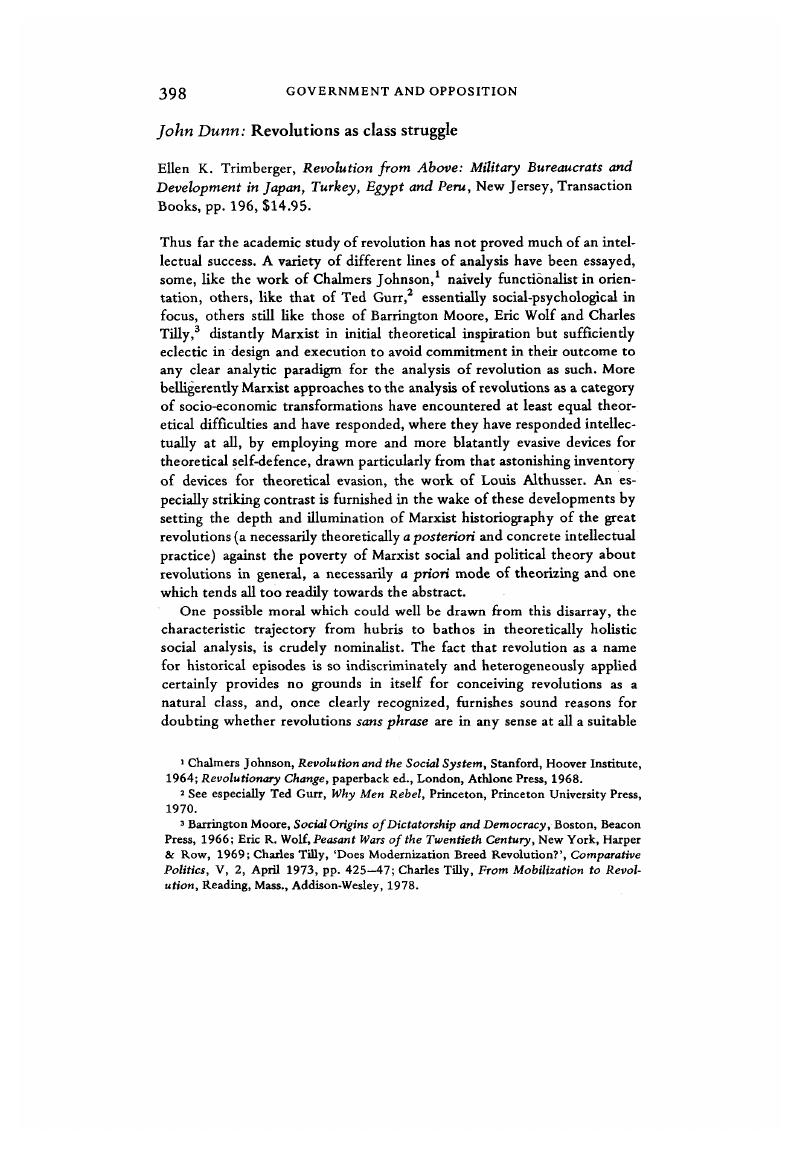No CrossRef data available.
Published online by Cambridge University Press: 28 March 2014

1 Johnson, Chalmers Revolution and the Social System, Stanford, Hoover Institute, 1964;Google Scholar Revolutionary Change, paperback ed., London, Athlone Press, 1968.
2 See especially Gurr, Ted Why Men Rebel, Princeton, Princeton University Press, 1970.Google Scholar
3 Moore, Barrington Social Origins of Dictatorship and Democracy, Boston, Beacon Press, 1966;Google Scholar Wolf, Eric R. Peasant Wars of the Twentieth Century, New York, Harper & Row, 1969;Google Scholar Tilly, Charles ‘Does Modernization Breed Revolution?’, Comparative Politics, V, 2, 04 1973, pp. 425–47; Charles Tilly, From Mobilization to Revolution, Reading, Mass., Addison‐Wesley, 1978.Google Scholar
4 Cf. Dunn, John Modern Revolutions, Cambridge, Cambridge University Press, 1972, pp. 226–57.Google Scholar
5 Skocpol, Theda ‘A Critical Review of Barrington Moore’s Social Origins of Dictatorship and Democracy’, Politics and Society, IV, 1, Fall 1973, pp. 1–30; ‘France, Russia, China: A Structural Analysis of Social Revolutions’, Comparative Studies in Society and History, XVIII, 2, 04 1976, pp. 175–210; ‘Old Regime Legacies and Communist Revolutions in Russia and China’, Social Forces, LV, 2 12 1976 , pp. 284–315;Google Scholar ‘Wallerstein’s World Capitalist System: A Theoretical and Historical Critique’, American Journal of Sociology, LXXXII, March 1977, pp. 1075–90.
6 Skocpol, Theda States and Social Revolutions in France, Russia and China, Cambridge, Cambridge University Press, 1979.CrossRefGoogle Scholar
7 Skocpol, Theda & Trimberger, Ellen Kay ‘Revolutions and the World‐Historical Development of Capitalism’, Berkeley Journal of Sociology, XXII, 1977–78, pp. 101–13.Google Scholar
8 See especially the formidable oeuvre of Professor Poulantzas, Nicos A convenient bird’s eye view of the implications of this approach can be derived from inspecting his article, ‘The Capitalist State: a reply to Miliband and Laclau’, New Left Review, XCV, 01. 02. 1976, pp. 62–83.Google Scholar
9 But for a well‐argued dissent to this view see Caplan, Jane ‘Theories of Fascism: Nicos Poulantzas as Historian’, History Workshop, III, Spring 1977, pp. 83–100.CrossRefGoogle Scholar
10 Trimberger, Revolution from Above, pp. 4–5, 41–3, 54, 78–9, 86, 91–2, 96, 151, 170n46, etc; Berkeley Journal of Sociology, XXII, esp. pp. 106–7.Google Scholar
11 Cf. Law, Robin ‘In Search of a Marxist Perspective on Pre-Colonial Tropical Africa’, Journal of African History, XIX, 3, 1978, pp. 441–52, esp. 448–51.Google Scholar
12 See Berkeley Journal of Sociology, XXII.
13 Miliband, Ralph Marxism and Politics, Oxford, Oxford University Press, 1977, pp. 108–9.Google Scholar
14 This would, for example, be a serious question to raise in relation to most West African states, whether or not any of these should properly be judged to possess a determinate internal ruling class. Cf. the essays collected in Dunn, John (ed.), West African States: Failure and Promise, Cambridge, Cambridge University Press, 1978, esp. pp. 7–8.CrossRefGoogle Scholar Trimberger’s perspective on the political implications of military initiatives is focused a trifle narrowly on patterns of internal class interests and is less illuminating in what it implies as to the concrete productive capacities of different societies at different times.